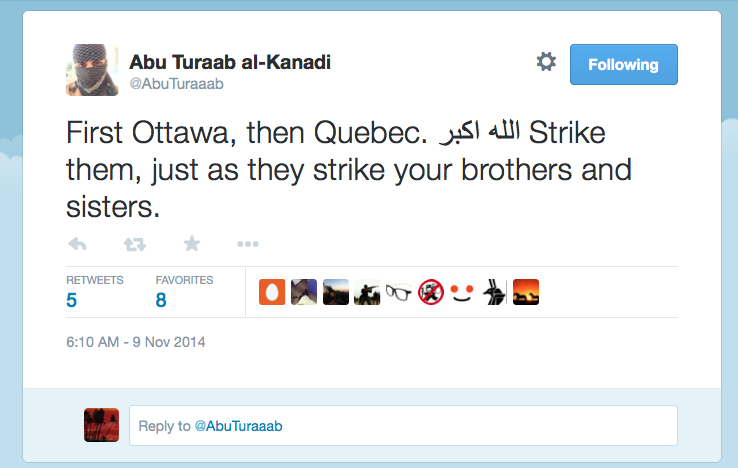Three Canadians were deliberately targeted by the coalition conducting airstrikes against the so-called Islamic State, according to a secret government document on the military’s role in the killing of its own citizens.

The Canadians were targets of Operation Inherent Resolve, the U.S.-led anti-ISIS campaign in Iraq and Syria that Canada participates in, said the briefing note prepared for the Chief of Defence Staff, General Jonathan Vance.
“To date, there have been three known instances where specific individuals targeted as part of Operation Inherent Resolve were believed to be Canadian citizens,” read the four-page document, obtained by Global News.
The briefing note is a discussion of the “strategic issues” arising from the targeting of enemy combatants who are Canadian citizens by Operation Impact, the Canadian Armed Forces contribution to Operation Inherent Resolve.
WATCH: ‘Nothing wrong’ legally with U.S.-led coalition airstrikes killing Canadians joining ISIS, says University of Ottawa Law Professor Craig Forcese

It laid out the legal justification for airstrikes killing Canadian foreign terrorist fighters in the region, saying their nationality was irrelevant and that each target of the coalition was “first and foremost, an enemy combatant.”
But the document went on to say that, “while the nationality of targeted individuals is, in the context of the Law of Armed Conflict, not an issue, domestic Canadian policy, political, and legal concerns may emerge.”
Titled “Op Impact — Canadian Citizens and Targeting of ISIS Combatants,” the brief, marked “secret,” was dated Sept. 16, 2015 but was only recently de-classified and released to Global News under the Access to Information Act.
It is believed to be the first official confirmation that the anti-ISIS military coalition, which includes Canada, has deliberately tried to kill Canadian citizens in Syria and Iraq. It did not say whether the targeted strikes were successful.
Experts said that under international law there was nothing illegal about the Canadian military participating in the killings of Canadian enemy combatants in an armed conflict. But it raises a host of questions and the government has not discussed the matter nearly as openly as its close allies.
“Your document is the first I’ve ever seen acknowledging that there have been instances in which Canadians were part of a target package” at the time Canadian forces were conducting airstrikes, said University of Ottawa law professor Craig Forcese, co-author of a 2016 paper on the legality of targeted killings of Canadian foreign fighters.
Global News also obtained two secret memos by the Department of Justice dated Oct. 8 and 15, 2015, however government officials completely blacked out their contents before releasing them after eight months.
Asked what role the Canadian military had played in the targeting of the three Canadians, Daniel Le Bouthillier, a National Defence spokesman, said he could not discuss the matter in detail for operational security reasons.
WATCH: Coalition airstrikes hit ISIS targets in Syria (2016)
But he said ISIS members who engaged in hostilities against the coalition could “in certain circumstances, be considered a threat” under the Laws of Armed Conflict.
“The nationality of the person is not a factor,” he said.
- What is a halal mortgage? How interest-free home financing works in Canada
- Capital gains changes are ‘really fair,’ Freeland says, as doctors cry foul
- Ontario doctors offer solutions to help address shortage of family physicians
- Budget 2024 failed to spark ‘political reboot’ for Liberals, polling suggests
Forcese, a national security law expert, said he saw nothing in the briefing note to suggest the legal advice it contained was incorrect. Under international law, those directly participating in hostilities in an armed conflict can be legally targeted, he said.
But he said there was no consensus on the meaning of “directly participating in hostilities.” While the U.S. defined it more broadly, others argued that “insurgents by night” can’t be targeted during the time they are acting as civilians.
The briefing note dates to the final weeks of the Conservative government. Airstrikes by CF-188 Hornets began in Iraq and Syria on Oct. 30, 2014. Canadian fighter aircraft struck 246 targets in Iraq and five in Syria over 16 months.
Prime Minister Justin Trudeau pulled the CF-188s from the conflict on Feb 15, 2016 but the Canadian military continues to participate in the anti-ISIS coalition. A separate Justice Department document, disclosed to Global News following its request for material on Canada’s policy on targeted airstrikes against Canadians, was dated 2016, after Trudeau took office. It was marked “secret” for reasons of cabinet confidence.
The United Kingdom and United States have both conducted airstrikes against their own citizens on the grounds they were threats. After two senior British ISIS members were killed in targeted airstrikes in 2015, the U.K. Intelligence and Security Committee conducted an investigation and published a public report.
Prime Minister Theresa May said in a statement last December that airstrikes against British citizens were a “last resort” but that when there was a direct threat to British citizens the government would “always be prepared to act.”
The killing of Reyaad Khan, a notorious British ISIS attack planner, followed a “rigorous decision-making process,” she said. “The Attorney General was consulted and was clear that there would be a clear legal basis for action in international law.”
The Canadian targets were not named in the heavily-redacted version of the briefing note disclosed to Global News but it was written two months after Calgary ISIS member Mohamed Farah Shirdon, aka Abu Usamah, was killed by a coalition airstrike in Mosul on July 13, 2015, according to the U.S. military.
Shirdon would have been a likely target because of his incitement of attacks in the West, along with Mohamed Ali, aka Abu Turaab, of Mississauga, Ont. and Abu Mohammed Al Kanadi, believed to be a senior ISIS member in Raqqah.
While the briefing note said targeted killings of Canadian terrorist fighters was legal, it also mentioned alternatives. “Canada may also wish to exploit Canadians allied with ISIS for intelligence, or consider prosecuting them under Canadian law,” it said.
Officials from the U.K and U.S. have said they preferred to kill foreign ISIS fighters overseas than see them return home. But the Liberal government had a different message when the issue arose last fall.
“Canada does not engage in death squads,” Public Safety Minister Ralph Goodale said on the CBC show Power & Politics last fall.
The briefing note suggests that at least some of the almost two dozen Canadian foreign fighters who have died in Syria and Iraq were killed in targeted strikes.
“This note provides a discussion of the strategic issues associated with the targeting of enemy combatants who are also Canadian citizens under the auspices of Op Impact, the CAF contribution to Operation Inherent Resolve.”
“As Canada is engaged in armed conflict with ISIS and associated armed groups, CAF operations under Op Impact include both direct and indirect support to, as well as participation in, strikes against target packages including enemy combatants,” it said. “On occasion, these target packages consist of specifically identified individuals, with nationalities in some cases known prior to engagement.”

The redacted version of the document did not elaborate on the “Canadian policy, political, and legal concerns” it said were raised by Canada’s role in targeting Canadians.
“The policy issues, I imagine, are tied to the reaction, political and otherwise, that Canadians might have to the idea that the Canadian state is targeting Canadians, even if from an international law perspective, in an armed conflict situation, it is lawful to do so,” Forcese said.
“From a legal perspective domestically, this is novel terrain,” he said. What remains unresolved is how the Charter of Rights and Freedoms would apply to a targeted killing. “There’s no precedent on this. My inclination is to suggest that the Charter will map international law in this area.”
Forcese said a targeted strike against a combatant was not the same as an extrajudicial execution that does not take place during an armed conflict. “Whether you’re killing within or outside of armed conflict makes a world of difference,” he said.
READ MORE: Terrorism charges laid against Canadian ISIS fighter
Chris Waters, an international law professor at the University of Windsor, said citizens not fighting in an armed conflict should not be targeted under Canadian or international law. However, picking up arms to fight for groups like ISIS makes them legitimate targets.
“Certainly, if the individuals have returned to civilian life in any capacity, I absolutely think it would not be legitimate,” he added. “During that period when they’re engaged in those active hostilities, they are legitimately targetable.”
He said whether targeted killings were the best policy was a separate question. “Certainly, the emphasis should be on de-radicalization, on inclusion, the variety of administrative measures that can be used including in the new bill, C-59, to prevent counseling of terrorists and offences and so on.”
“But I think when it comes right down to it from a, strictly speaking, legal perspective, certainly from an international legal perspective, if someone is engaged in fighting with an armed group, they’re targetable under the laws of armed conflict.”

NDP Foreign Affairs critic Hélène Laverdière called on the government to be more transparent about Canadians who have been declared enemy combatants and those that have been targeted by Operation Inherent Resolve.
“The issue is making sure that was done according to Geneva conventions,” she said. “I think there should be an explanation from the government. Let’s see what the government comes up and if there’s a need then for a formal inquiry.”
Laverdière said while there can be legal justification for targeting enemy combatants there was a “black hole of information” on this issue. “We have a government that talks a lot about transparency but when we compare it to other countries it has very little.”
Forcese also argued the government should be more forthcoming about targeted killings. “We have to ask the question, I think: above and beyond the legal minimum, are there policy issues where we would decide to not kill Canadians, or in this case, kill Canadians? And that’s the sort of debate that I think probably deserves to be a much more open now.”








Comments